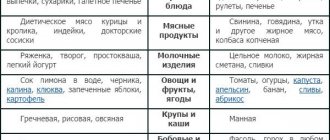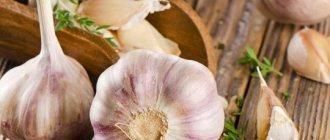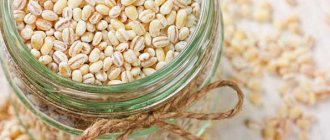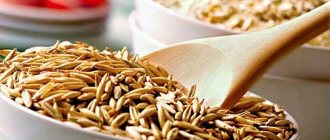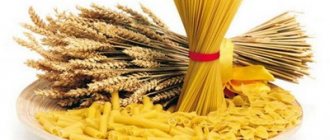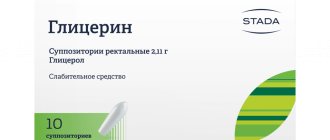Diarrhea is a symptom of a wide range of diseases, but most often its development is facilitated by intestinal infections, taking certain medications, food poisoning, neuroses and depression. Regardless of the reasons that caused the stool disorder, all patients are prescribed a special diet, astringents and absorbent agents.
Rice water is an effective remedy for diarrhea. Rice inhibits motility and tone of intestinal smooth muscles, reduces the number of urges to empty the bowel, reduces the manifestations of flatulence, normalizes stool, and removes waste and toxins.
In the article we will consider: the usefulness of rice for diarrhea, how to properly prepare and take rice broth for diarrhea for adults and children, in which cases it will be effective, and when it can harm the body.
Does rice water help with diarrhea?
Rice water is used to treat acute diarrhea, in which loose and unformed stool appears no more than three times a day and lasts no more than three weeks. It is also necessary to pay attention to the causes of diarrhea.
Rice water will help in cases where loose stools are caused by overeating or food poisoning, fermentation of food in the intestines, nervous excitement, improper use of laxatives or other medications.
In cases where the cause of diarrhea is viruses, bacteria, ischemic and inflammatory bowel pathologies, diseases of the pelvic organs, rice is used as a symptomatic remedy. For a favorable outcome, the patient needs a comprehensive examination, the prescription of adequate methods of conservative therapy, and sometimes surgical treatment.
Operating principle
Let's look at the structure of a grain of rice. Its basis is made up of fibers, between which there are other substances. Soaked rice leaves a starchy residue at the bottom of the container. When cooked, starch, vitamins and other substances are separated, as a result, the biological value of the grain is partially lost, only fiber (fiber) remains in it.
Rice starch, which remains in the broth, ensures the antidiarrheal effectiveness of the product. Starch protects the intestinal walls from the influence of irritating substances, including gastric juice, and makes their absorption difficult. The decoction also has an inhibitory effect on intestinal motility, inhibits the urge to defecate, the contents pass through the gastrointestinal tract longer, and reduces the manifestations of flatulence and bloating.
During diarrhea, rice acts as a sorbent: when it enters the body, it attracts and retains various toxic substances, removes waste and toxins. Unlike other sorbents, it has a delicate and mild effect without causing adverse reactions.
Reference . Rice water is considered nutritious; it contains a lot of protein, vitamins, and carbohydrates, which pass from the rice grain into water. Therefore, when diarrhea is accompanied by a lack of appetite, the patient’s reluctance to eat food, so as not to provoke another act of defecation, taking rice water can partially replenish the body’s needs for energy and nutrients.
Diet for infants
You should not force your child to eat
Despite the fact that doctors previously recommended abstaining from any food at all, modern pediatricians do not adhere to this concept. Lack of nutrients during fasting will negatively affect the development of the baby, lack of protein for his growth, sudden weight loss, and decreased immunity.
In such conditions, it will be very difficult for the baby’s body to recover quickly, tissue regeneration will slow down and the intestinal mucosa will be damaged for a long time. Therefore, it will be impossible to switch to regular food for a long time.
For breastfed babies, it is recommended to continue feeding much more often, while reducing the single dose.
Breast milk is an indispensable product for babies up to one year old, even during diarrhea: the biological active substances it contains help strengthen the immune system and help the baby cope with the disease.
Feeding bottle-fed babies must be approached individually. The amount of mixture is determined based on the frequency of regurgitation and the presence or absence of vomiting. Feeding should be done every 2 hours, the volume of the mixture should be 50 ml. On the 4th day, feeding is gradually transferred to normal mode. Babies from five months of age are allowed to feed with dairy-free rice or buckwheat porridge. Children aged eight months need to add yolk, meat broth, jelly and meat puree to their diet.
How to cook rice water correctly
At home, you can prepare classic rice water. In cases where diarrhea does not go away for more than two days or the body refuses to take food, prepare a cream decoction of rice. It is more intense, relieves irritation of the mucous membranes, saturates the body, and improves overall well-being.
What kind of rice is suitable
There are 18 types of rice, differing in color, grain length, and processing method. To prepare rice water, it is better to choose white (polished). The shape and size of the rice grain does not matter.
The most important point is the way rice is processed during production. Regular white (polished) rice contains a large amount of starch, which is what causes the astringent and antidiarrheal effect. Steamed varieties are less effective, since during steaming the percentage of gluten content decreases.
Instructions for preparing the decoction
Recipe for classic rice water:
- 1 tbsp. l. Rinse the rice under cold running water.
- Boil 500 ml of water, add rice.
- Simmer over low heat for 35-45 minutes, stirring occasionally.
- Strain the warm rice twice through cheesecloth folded in several layers.
To prepare rice cream broth, you need to fry 5 tbsp in a frying pan without oil over low heat. l. clean cereal. The finished rice should have a golden hue. Next, you need to grind the rice using kitchen utensils. Add ground cereal to a saucepan filled with three glasses of water. Cook over low heat after boiling for 20-25 minutes. Take the cream decoction chilled.
How and how much to store
Rice water is stored in an airtight glass container with a lid. The shelf life is 96 hours (four days) from the moment of preparation in the refrigerator and 48 hours at room temperature.
Diet for children over one year old
At the onset of the disease, it is necessary to add two more meals between feedings and reduce the amount of food per meal. The amount of food increases daily. A diet for diarrhea in a child includes eating cereal soups:
- Rice
- Buckwheat
- Perlovova
Then you can switch to porridge from the same cereals. You can give your baby pureed soups with vegetables:
- Potatoes
- Carrot
- Zucchini
- pumpkin
These vegetables are good for the intestines, because when cooked they contain a large amount of pectin - a substance that can bind water and swell, forming a mass that, passing through the esophagus, adsorbs the remains of microorganisms, bacteria and toxic substances.
When exposed to an acidic environment, pectin breaks down into microelements, including calcium, which has an anti-inflammatory and restorative effect for the intestines. Fresh berry jelly is good as a dessert. For diarrhea, jelly and blueberry fruit drinks are preferable.
Eating thermally processed vegetables and fruits helps to eliminate the symptoms of intoxication and normalize stool. You can include jellies, compotes, fruit drinks and mousses with the addition of lemon or cranberry juice in your diet. On the third day, it is allowed to include fermented milk products in the diet to restore the intestinal microflora:
How to use
The dosage and duration of treatment with rice water depends on a number of factors: the age of the patient, the causes and characteristics of the course of diarrhea, the body’s reaction to the measures taken, and are determined in the case of a particular patient.
Important . Due to the loss of large amounts of water and salts, the patient may develop dehydration. Doctors recommend drinking more water. The average daily intake for children of the first year of life is 500 ml, from one to three years - 500-700 ml, from 3 to 12 years - 1 liter or more, adolescents and adults - 2-3 liters of liquid.
In case of poisoning
In case of poisoning, rice water acts as a sorbent, reduces intestinal motility, relieves pain, heaviness in the abdomen, and flatulence. To achieve the desired effect, an adult needs to drink 300-500 ml of decoction throughout the day, 50-70 ml at a time.
For children, the dosage is halved. To reduce the load on the digestive tract, you should avoid eating other foods, including boiled rice, on this day.
For diarrhea not associated with poisoning
A single dosage for adults and children over 12 years of age is 40-50 ml . It is recommended to take the decoction every 3-4 hours, but no more than 4 times a day.
Rice absorbs harmful substances accumulated in the intestines, normalizes the consistency of stool, gently and painlessly cleanses the body, and restores intestinal motility.
As a rule, improvements are noticeable after the first dose. To completely get rid of the symptoms of diarrhea, on average, 1-2 days of treatment are enough.
Important . If you continue to drink the decoction after the stool has returned to normal, there is a risk of constipation.
Use for severe and prolonged diarrhea
In case of severe diarrhea for more than two days, it is recommended to prepare and consume rice cream broth according to the following scheme: 1 tbsp. l. every hour for 12 hours. For children, the daily norm is 12 tsp.
The dosage can be adjusted depending on the age of the patient, the frequency of bowel movements, and the body’s reaction.
Contraindications
When the body's condition is at a critical level, making rice water is contraindicated. The following conditions are recognized as:
- Severe vomiting (often observed with serious intestinal infections).
- The presence of blood, mucus or other impurities in the stool, if the child’s stool is green. When such a situation arises, do not hesitate, immediately go to the nearest medical facility. An admixture of foreign substances in the feces is a sign of a serious and life-threatening disease for the child.
- Fever. In this condition, using a folk remedy will worsen the condition.
- Diarrhea caused by bacteria and viruses. This requires the primary use of special medications prescribed by the attending physician.
General tips:
- If the prepared remedy does not help within three days, you will need the help of a doctor.
- With prolonged use of the product, constipation occurs - the opposite of diarrhea. Limit use to no more than three days, if necessary.
- If stool normalization occurs earlier, you can stop taking it.
- Soldering should be frequent, and the volume of liquid consumed at a time should be small. Otherwise, vomiting will occur.
Nuances of preparation and use
The effectiveness of treating diarrhea with rice water depends on compliance with the preparation recipe and dosage, the causes of diarrhea and concomitant treatment.
For children (including infants and teenagers)
The proportions and recipe for preparing rice water for infants and young children are somewhat different.
It is recommended to pre-rinse the rice and soak it for 6-12 hours in cold water, or leave it overnight. The decoction is prepared less saturated: for 500 ml of water you will need 1 tsp. rice cereal. Pour pre-soaked rice into boiling water and cook over low heat for 45-60 minutes, stirring occasionally. Strain the broth through several layers of gauze.
To treat diarrhea, the child is given 30-50 ml of decoction 3-4 times a day. At the same time, it is important to monitor the baby’s well-being: if improvements are noticeable after the first dose, the stool has become thicker, the frequency of bowel movements has decreased and is not accompanied by pain, there is no need to continue taking the decoction. It is better to offer your child strong sweet tea with homemade rye crackers and a small portion of boiled rice.
Important . All actions should be discussed with your doctor. Many foodborne illnesses are severe and require hospitalization of the patient.
For adults
To prepare rice water, use purified or distilled water. Choose white rice (unpolished) .
It is important to properly prepare the grains: rinse under running water at room temperature 5-7 times. During cooking, make sure that the rice does not burn; add water if necessary. The medicine should have a viscous consistency and a bland taste. Do not add salt or sweeten.
If the use of rice water is accompanied by a deterioration in general health, rash, redness and itching of the skin, lack of stool for 48 hours or insufficient bowel movements, it is necessary to stop treatment. If unpleasant symptoms persist, seek medical help.
What to cook to restore stomach function
For the normal functioning of the immune system and the body's ability to resist attacks from pathogens, it is necessary to ensure an optimal supply of macro- and micronutrients daily. The need for them during illness increases significantly. Therefore, a diet based on a properly designed menu will not only not harm you during illness, but will also help you recover faster.
It is a big misconception to think that in case of intestinal disorders with diarrhea and vomiting, the diet is strictly limited, and the list of allowed products is almost ascetic: bread and water. In fact, according to Associate Professor of the Department of Gastroenterology and Nutrition of BelMAPO, Ph.D. Elena Adamenko , the diet can remain familiar even during illness (provided that before that it was based on the principles of a healthy diet). You can only make some adjustments until the gastrointestinal tract returns to normal.
For example, prefer applesauce to apples (the peel of the fruit is rich in fiber and is difficult to digest during intestinal disorders). It is better to replace fresh bread with “yesterday’s” bread or unsweetened crackers. If possible, avoid herbs and spices, food additives, so as not to further irritate the intestinal and stomach mucosa, etc. You can read even more about nutritional rules for gastrointestinal disorders in this material.
What is the best rice to eat for diarrhea?
Boiled white rice without adding salt, oil, or spices copes well with the manifestations of diarrhea. It has an astringent effect, which normalizes the functioning of the digestive tract and reduces intestinal motility. By removing fluid from the stool, their normal consistency and frequency of bowel movements are restored.
For a positive result, you need to eat rice in small portions every 3-4 hours. The effect depends on how properly the cereal is prepared.
How to cook properly
First of all, you need to prepare the rice: rinse 1 cup of cereal 5-7 times, leave in a colander to drain. Boil 5 cups of water in a saucepan, add rice, stir. After the contents of the pan boil, reduce the heat and cook for 30-45 minutes until all the water has evaporated. Serve warm without sugar, salt or butter.
Meat zrazy stuffed with omelette
For preparation you will need:
- beef tenderloin – 300 g
- stale white bread – 40 g
- milk – 100 ml
- egg – 1 pc.
- salt to taste
- butter – 5 g
First, prepare an omelette: beat the egg with milk, add a little salt. It is better to bake in a dry non-stick frying pan over medium heat with a lid. If you don’t have such utensils, you can lightly grease the bottom of the pan with melted butter. The finished omelette should be cooled and chopped into small pieces.
Soak white bread in milk, squeeze. Pass the meat with the soaked bread through a meat grinder twice - the smaller the pieces of beef, the more homogenized the consistency of the minced meat, the better. Add salt and mix well.
Form the minced meat into flat cakes, place an omelette in the middle as a filling, carefully pinch the edges of the flat cake. Steam meat zrazy stuffed with omelette (in a double boiler, slow cooker, or in a saucepan with a lid, using special inserts for steaming). Cooking time – 40 minutes.
Fish quenelles
Omega-3 polyunsaturated fatty acids are beneficial and essential for a healthy body. And especially for the sick person. They have anti-inflammatory properties and have a beneficial effect on the body's immune capabilities. Recently, studies have appeared that indicate that omega-3 fatty acids can suppress viral activity in the body. The key source of valuable product is fish. You can also include it in the menu for diarrhea, vomiting or other gastrointestinal problems.
For preparation you will need:
- fish fillet (pike perch, cod, hake, pollock, etc.) – 300 g
- stale white bread – 30 g
- melted butter - 3 tsp.
- cream – 90 ml
- a pinch of salt
Soak the bread in cream. Pass the fish fillet through a meat grinder and mix with soaked and squeezed white bread. Form small quenelles (about the size of a large walnut). Boil for 5 minutes in boiling, lightly salted water. As a side dish you can serve buckwheat, oatmeal or pearl barley porridge cooked in water.
